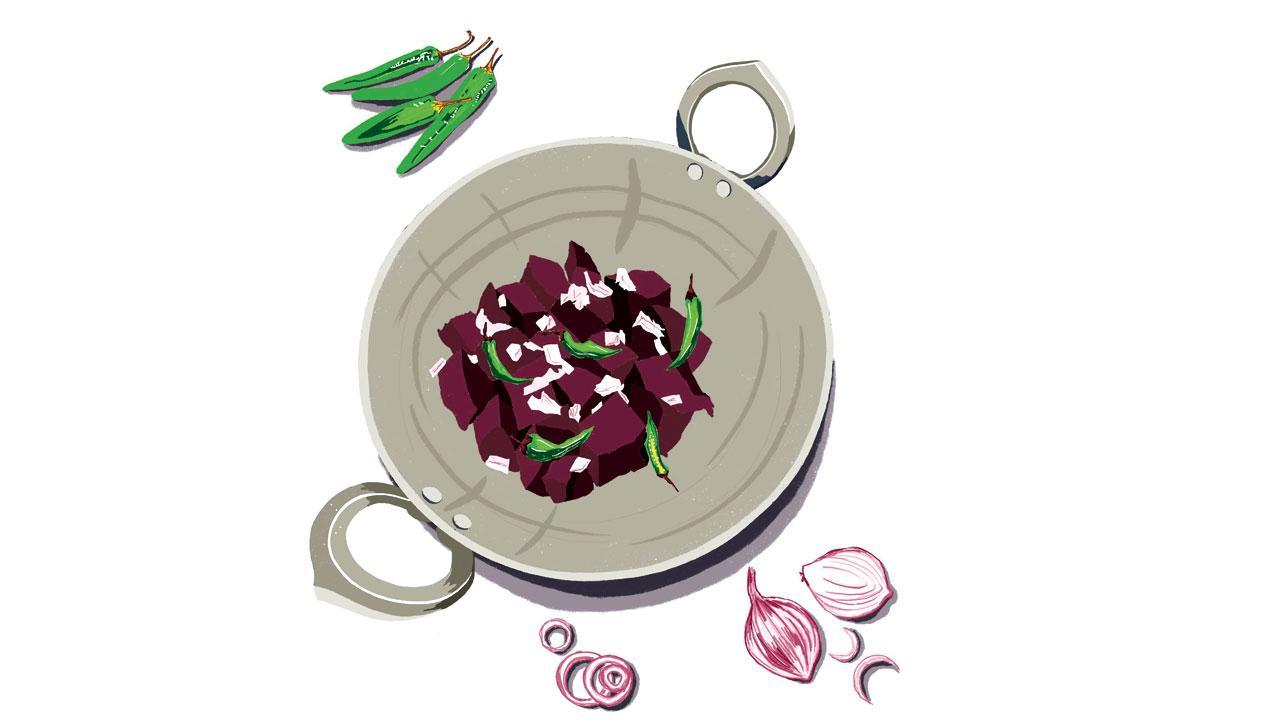A Mumbai-based artist is creating a series of illustrations on Instagram, depicting dishes from Dalit culinary traditions along with their recipes

Illustration of a dish called lakuti, made from freshly-prepared Ratki
At first glance, her illustrations might seem simple, but there’s more to them than meets the eye. Instagram artist @thebigfatbao (real name withheld on request) firmly believes that food is a marker of social status that highlights various existing socio-geographical differences across communities.
ADVERTISEMENT
A simple egg roast or egg curry, consumed with rice. Although the recipe varies from region to region, basic ingredients like onions, tomatoes, chillies and turmeric remain the same
Through her work, she argues that while food can serve as a ground to understand cultures, for DBA (Dalit, Bahujan, and Adivasi) communities, the experience is different — it is often rooted in memories of oppression, humiliation, and discrimination. As crores of people around the world took to Instagram to showcase their cooking skills during the pandemic, as a woman from the Dalit community, this artist wanted to utilise the platform to illustrate and educate people on the topics of caste, food and imposed gender roles. This is how the idea for a series called Caste And Food was born, as a set of illustrations that depict dishes that are at the heart of Dalit identity and resistance, along with their recipes that have been passed down from one generation to the next.
Ratki, made from the blood of goats, cows, buffaloes or sheep
“In South Asia, the question of caste cannot be ignored. It is a part and parcel of everyday life. From the kind of water that is available for us [DBA communities] to the size of land, if at all available — all of it is deeply rooted in caste. I’m not the first person to speak about food and caste. Many great women like Urmila Pawar and Babytai Kamble have spoken about caste and food ages ago. Our food is very much a defining factor of our identity,” shares the artist.
The illustrations depict fare such as ratki, a jelly-like dish traditionally made with blood from goats, buffaloes, cows or sheep, boiled with salt and often used to turn into another dish called lakuti that is seasoned with onions and spices and is to be eaten with bhakri or chapati. Recipes for these dishes accompany the illustrations in the Instagram posts, along with relevant information about their origins.
A dish made of pumpkins, called bhoplyacha kees
“These recipes were handed down from my mother’s side. My grandmother was a very good cook and so is my mother. All three of us had to learn how to cook at a very young age. Fortunately, by the time I was born, our financial condition had improved and we could afford a well-stocked kitchen with stainless steel vessels. I’ve also asked friends from different parts of the country to share recipes from their states,” says the artist.
In a digital space that is dominated by Western and Savarna (upper-caste Hindus) influencers, voices of Dalit artists are often overshadowed and this artist aims to challenge that. “The polished and dull content that reflects the multi-layered privileges of gender and caste dominates visuals on social media platforms. In fact, the ultra-refined, minimalist decor or art that influencers use somehow always manages to alienate Dalit voices and art in digital spaces. That’s where I’m trying to make a small pocket for myself on this worldwide platform. I think my work illustrates the memories and lived experiences of the many Dalit women who experience oppression at various levels every single day of their lives. Today, the Internet is a democratic space, so to speak, and as Dalits, we have to take advantage of this space to spread awareness about and celebrate our culture,”she states.
Also Read: Nature’s wrap
Log on to: @thebigfatbao on Instagram
 Subscribe today by clicking the link and stay updated with the latest news!" Click here!
Subscribe today by clicking the link and stay updated with the latest news!" Click here!






